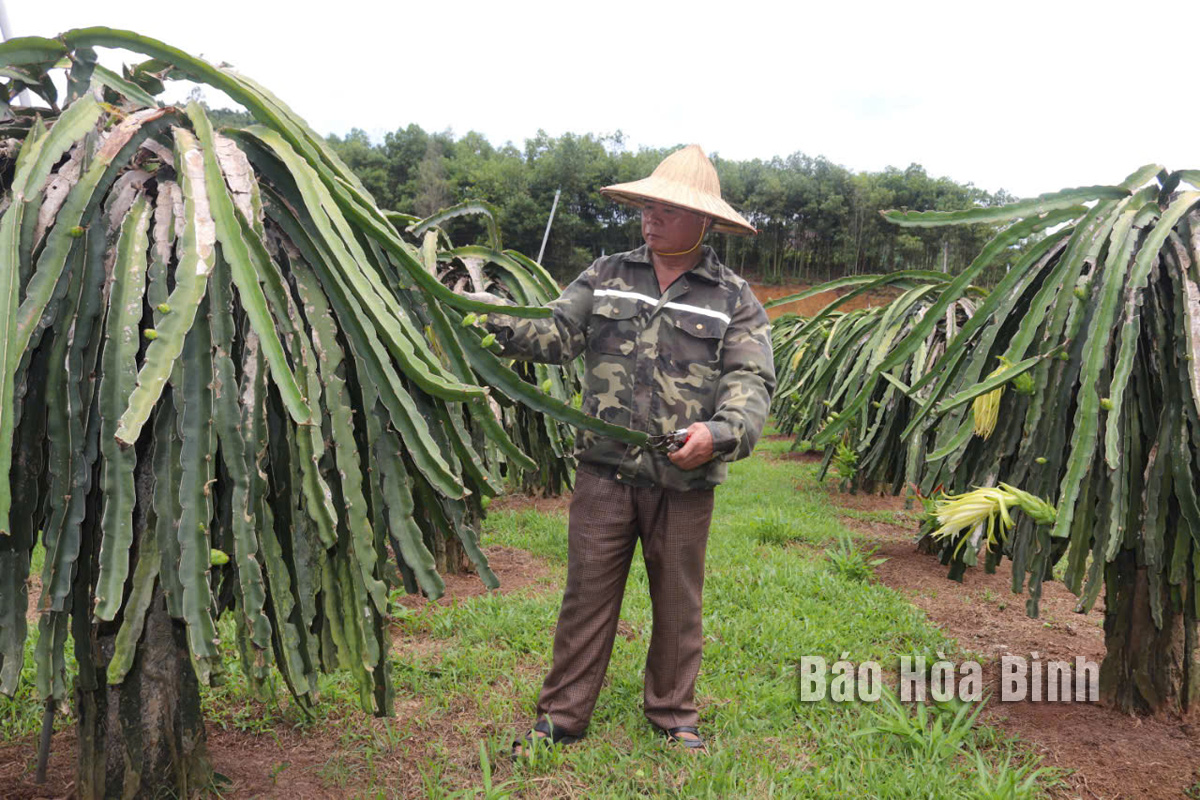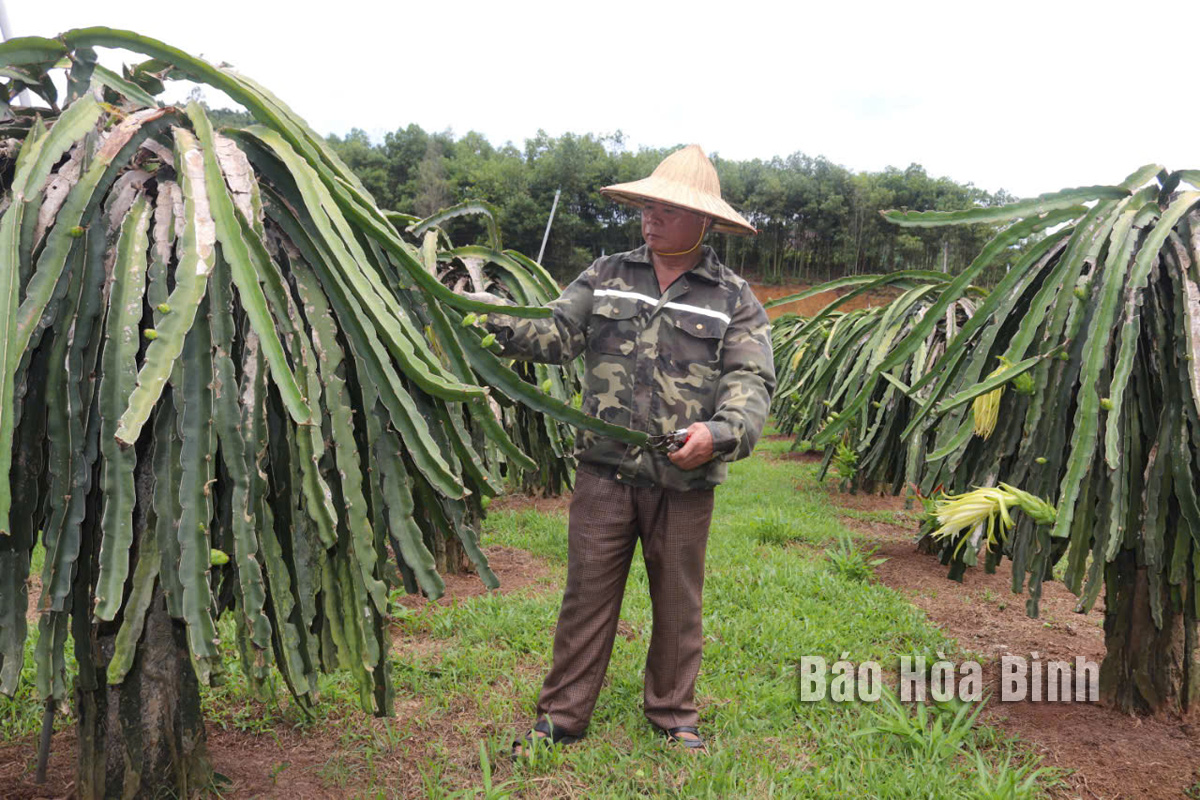
Dong Bac dragon fruit cooperative group in Dong Nang hamlet in Dong Bac commune of Kim Boi district is one of the cooperatives that has demonstrated effectiveness in promoting the linkage of production and consumption of dragon fruit. The entire area of 4.5 ha of dragon fruit is cultivated according to VietGAP standards.
Bui Van Binh in Dong Nang hamlet, Dong Bac commune (Kim Boi district) takes care of a dragon fruit garden.
As a pioneer in growing dragon fruit in the northeastern area of Hoa Binh province, Bui Van Binh in Dong Nang village has accumulated extensive experience and techniques in caring for the plant. Binh said his family has been growing dragon fruit for 10 years.
Previously, his family switched less productive rice growing areas to cultivate corn and sugarcane, but their yield and quality did not meet the required standards.
Binh said that he learned dragon fruit cultivation techniques in Lac Thuy district and then conducted a trial planting.
According to Binh, dragon fruit is planted from November to December. After about 18 months, the plants will bear their first fruits and have fruits steadily from the third year. Dragon fruit is harvested from June to December each year.
Binh said the most important aspect of farming in line with VietGAP standards is that growers must use fertilizers and pesticides in compliance with the stipulated pre-harvest interval, which ranges from 10 to 15 days.
Every year, with 500 dragon fruit trees, Binh's family harvests 10 tonnes of fruits. Thanks to applying safe care procedures, the fruits always ensure sweetness and weight. Each year, the family earns from 120 – 150 million VND (4,880-6,100 USD) after deducting expenses.
As one of the members with a stable income since joining the Dong Bac dragon fruit cooperative group, Bui Van Tinh in Dong Nang village owns a 0.5-ha dragon fruit garden with approximately 700 trees.
Tinh said that to ensure the dragon fruit grows well, his family weeds and fertilises the trees four times a year. Fertilizers used are of organic origin. Compared to other crops, dragon fruit has a long harvesting period, making it easier to sell. High-quality fruits weighing over 400 grammes and with attractive appearance are bought directly by traders from Hai Duong and Hanoi at a price of 20,000 VND per kilogramme. Each year, the family earns about 200 million VND from the crop.
So far, dragon fruit farming has begun to bring economic benefits to 15 member households of the cooperative group. Statistics show that the dragon fruit growing area of Dong Bac commune is about 10 ha, concentrated in Dong Nang, Ve, Dam Dinh, Trang villages.
According to Nguyen Thi Minh Anh, deputy head of the division of agriculture and rural development of Kim Boi district, to develop and expand the area of dragon fruit cultivation, the district's authorities will continue to direct small-scale production households in villages and communes to form cooperatives and produce in line with value chains.
The district will also support local farmers access to loans, grant certifications of good agricultural practices (VietGAP, GlobalGAP), provide training in techniques of dragon fruit cultivation and care, and help households and cooperatives in introducing products and connecting consumption through fairs organised by the district and the province, she said.
According to data from the Hoa Binh Provincial Party Committee, the industrial production index for the first six months of 2025 is estimated to have increased by 20% compared to the same period last year. This marks the highest year-on-year growth rate for this period since 2020.
In the first six months of 2025, Hoa Binh province’s export turnover was estimated at 1.145 billion USD, marking an 18.11% increase compared to the same period in 2024. Import turnover was estimated at $ 804 million, a 17.15% increase, which helped the province maintain a positive trade balance.
The lives of the ethnic minority farmers in Tan Lac district have gradually improved thanks to the new directions in agricultural production. This is a testament to the collective strength fostered through the professional associations and groups implemented by various levels of the district’s Farmers’ Union.
With the motto the "product quality comes first,” after nearly one year of establishment and operation, Muong village’s Clean Food Agricultural and Commercial Cooperative, located in Cau Hamlet, Hung Son Commune (Kim Boi district), has launched reputable, high-quality agricultural products to the market that are well-received by consumers. The products such as Muong village’s pork sausage, salt-cured chicken, and salt-cured pork hocks have gradually carved out a place in the market and they are on the path to obtaining the OCOP certification.
In the past, the phrase "bumper harvest, rock-bottom prices" was a familiar refrain for Vietnamese farmers engaged in fragmented, small-scale agriculture. But today, a new spirit is emerging across rural areas of Hoa Binh province - one of collaboration, organisation, and collective economic models that provide a stable foundation for production.
Maintaining growing area codes and packing facility codes in accordance with regulations is a mandatory requirement for agricultural products to be eligible for export. Recently, the Department of Agriculture and Environment of Hoa Binh province has intensified technical supervision of designated farming areas and packing facilities to safeguard the "green passport" that enables its products to access international markets.



